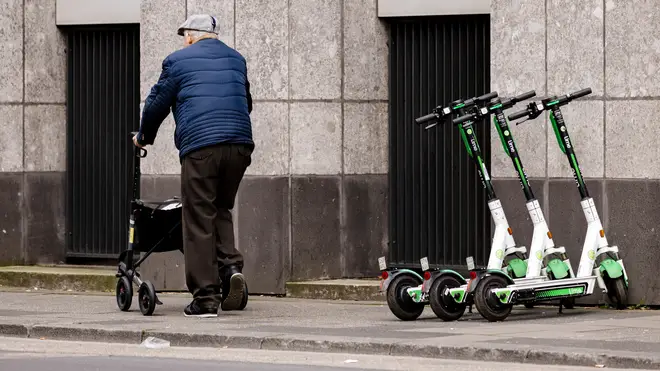
Simon Marks 4pm - 7pm
16 March 2020, 07:50 | Updated: 16 March 2020, 10:27

Electric scooters could soon be seen on UK roads as part of a proposed Government "transport revolution"
The Department for Transport (DfT) is consulting on what rules are required to allow them to be trialled safely.
Proposed rules suggest eScooter riders could be forced to wear helmets in the same way as motorbike riders, which would be a deviation from cyclists who do not have to wear head protection.
Testing is set to take place in several cities across the UK from next year as part of efforts to draw up new rules for the popular devices, which are currently banned everywhere apart from private land.
Other rules being considered are whether eScooters should have a minimum age of 16 and what their speed limit should be set at.
Other proposals to enable modern technology to improve journeys include conducting drone medical deliveries and new public transport booking systems.
E-scooters are similar in design to a traditional child's scooter but are powered by an electric motor.
Other topics include minimum design standards, whether they should be allowed in cycle lanes, and what powers local authorities should have to manage e-scooter hire firms.
Transport Secretary Grant Shapps said the UK is "on the cusp of a transport revolution" as emerging technologies are "ripping up the rulebook".
He went on: "Our groundbreaking Future of Transport programme marks the biggest review of transport laws in a generation and will pave the way for exciting new transport technology to be tested, cementing the UK's position as a world-leading innovator.
"This review will ensure we understand the potential impacts of a wide range of new transport types such as e-scooters, helping to properly inform any decisions on legalisation."
Many people use e-scooters in the UK despite them not being allowed on public roads and pavements.
The Metropolitan Police caught nearly 100 riders in London in a single week last summer.
YouTube star and TV presenter Emily Hartridge became the first person in the UK to be killed while riding an e-scooter when she was struck by a lorry in Battersea, south London, in July last year.
E-scooters will initially be trialled in four Future Transport Zones.
They are: Portsmouth and Southampton; the West of England Combined Authority (WECA); Derby and Nottingham; and the West Midlands.
Local authorities in the areas will contract firms to provide e-scooters available for hire on the streets.
The Government needs to amend legislation before the pilot schemes can begin, meaning it will be several months until e-scooters are allowed on UK roads.
Trials of various types of transport innovation in the Future Transport Zones will be supported with £90 million of Government funding.
Medical supplies from clinics on the Isle of Wight will be carried to hospitals on the mainland by drones, in a pilot scheme which will save time compared with transporting items on ferries and roads.
WECA will test self-driving cars to move people between Bristol airport, the northern suburbs of Bristol and central Bath.
The Government will also consult on how to test emerging technology in bus, taxi and private hire vehicle services to ease journey planning and payment.
This includes making it easier for buses to operate on-demand and enable people to book journeys across multiple modes of transport in a single transaction.